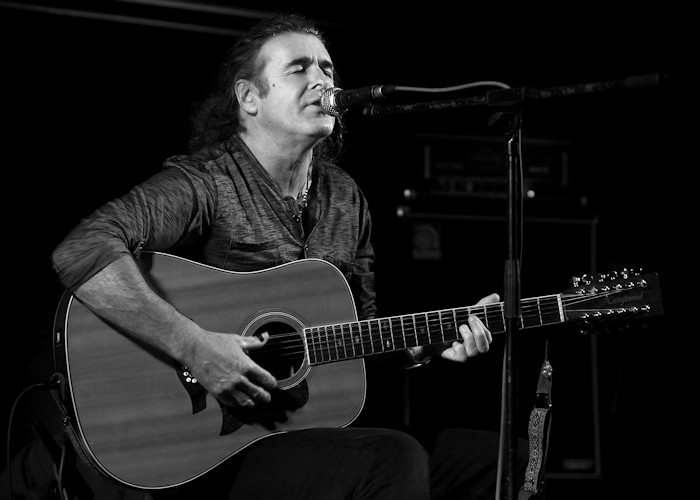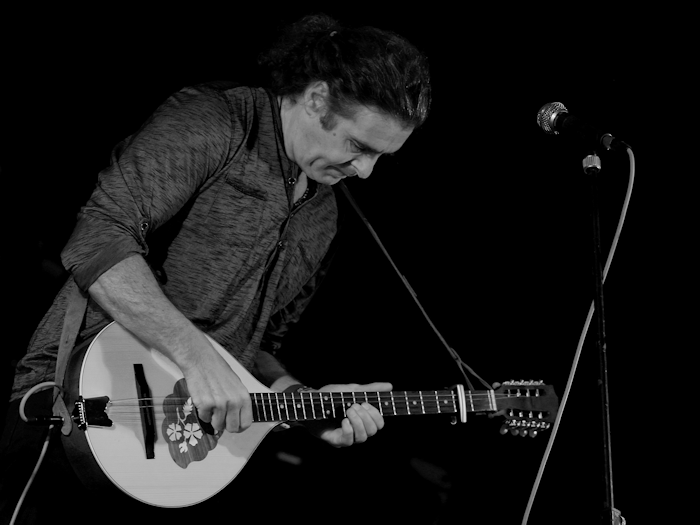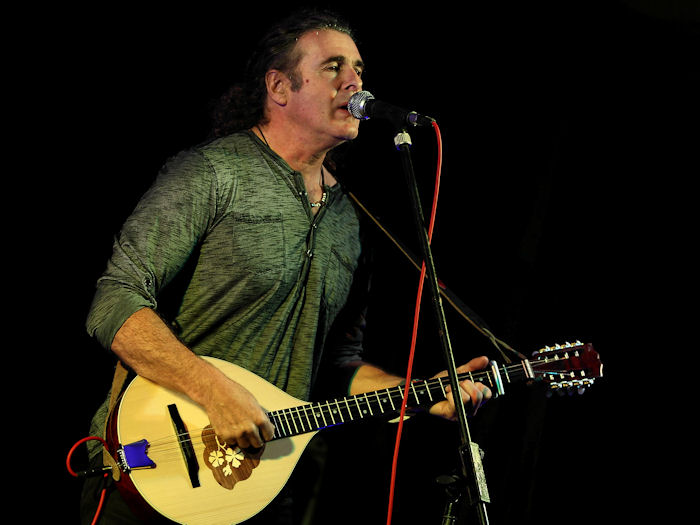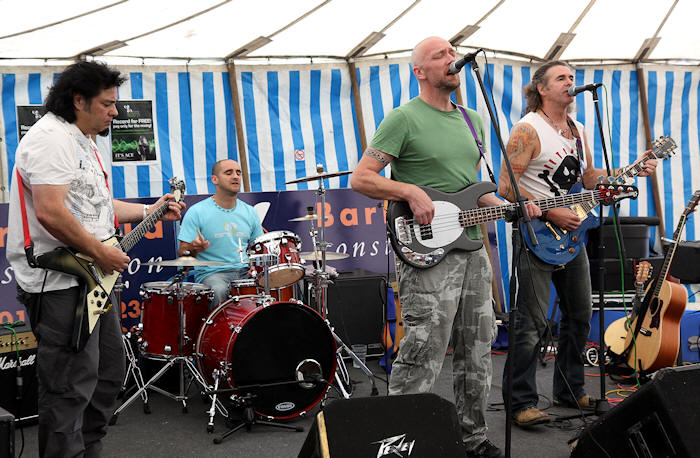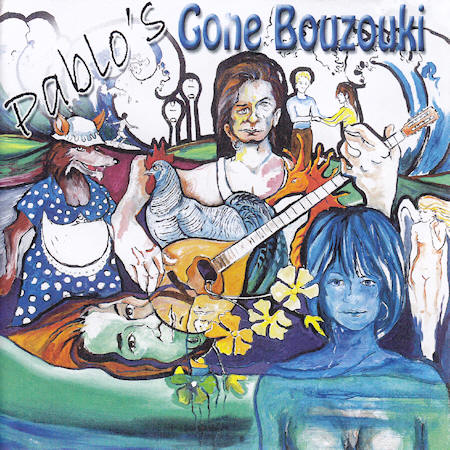
Painting © 2004 Loz
Arkle
Website
© Copyright 2000-2011 Alan White - All
Rights Reserved
Site optimised for Microsoft Internet Explorer
Early Blues Interview
|
||||||||||||
|
"Karac consists
of four experienced musicians and songwriters of very different
influences who come together to write their own brand of music. We
feature an eclectic mix of instruments and styles and our music draws
heavily on the light-and-shade principles of song writing adopted by
many of the classic bands that influenced us in our formative years. The
most important thing for us is that our music sounds original and
interesting. We write and play what we ourselves would like to hear and
try not to fall into the current trend of borrowing and cloning of other
peoples material that so much modern music relies on. Its a journey of
discovery. We hope you come along for the ride.
_________________________________________________________________________
Christine (my wife) and I caught up with Steve (Pablo) Jones at the Skegness Rock and Blues Festival. Alan: What did you want to be when you were young Ė an artist or a musician? Pablo: Definitely an artist. The only thing I was ever good at in school was painting, I was rubbish at everything else but always top of the class in the art. I have this theory that if youíre good at something then you should stick to it so I always knew Iíd have to try and do something with art. Alan: Did you come from an artistic or a musical family? Pablo: My Gran and my Dad both paint, also my sister, so yes, there is something there. Alan: How did you get started in painting as a career? Pablo: My first job, because I was so useless at everything else, was in a pottery in Wales drawing birds and animals on the pottery and I used to have to engrave the drawings on. At the time I was going through a stage of learning to do scraper boards, which are a black background where you scratch the ink off and it becomes white and the pottery was the same theory. You werenít allowed to test the pottery and you used to have to engrave the images in. So I knew even then that it was possible to make money out of art. Christine: Have you always worked in Art as a career? Pablo: When times have been really bad you could probably name hundreds of ďproperĒ jobs that Iíve done from labouring to selling fish to selling coal. Alan: If art is bringing you money, isnít a proper job?? Pablo: Well, itís bringing me money but you canít say itís constant. The lads on the construction sites were labouring from 7 to 7 and those are the guys that I take my hat off too because they were so keen on the work and they really enjoyed it. For me it was like being in a press gang. I donít know if art sounds as a proper job because it's not consistent and you donít get a proper wage. Youíre always living on your, well, sometimes you do well and sometimes you donít. Itís a choice I made. Alan: Who has inspired you in your painting? Pablo: All art inspires me. Iíve been to the Tate, to the Louvre and recently I met a top Spanish artist called Alberro ... thereís a painting by Renoir that sort of got me going, there's something about his painting, but all arts inspired me. Alan: Tell me about your non-musical art. Weíre used to seeing you at blues festivals with your musical portfolio but I think you do a lot of other work too? Pablo: There was a Welsh artist called Caitlin Williams who did palette knife work. On the face of it, it looks very very easy but when I tried to do it, I couldnít. It took me a while but now Iíve got one knife I can use. Itís a totally different technique and I do landscapes and seascapes but with very very thick paint and a lot more colour. Thereís another type of art that probably too difficult to explain without seeing it visually and I havenít got many samples it, but lines go through the painting and youíll see that some of my big paintings there are some lines that go through some of the images. Itís too difficult to explain how that happens but Iím working on that as well. so there are different types of art I do as well.
Pablo: You develop as a person and as an artist as you get older. They say that as you get older you can leave stuff out, and the more you can leave out, the better it is. I think you start finding your personality more. Now, after all these years of drawing and painting, my work is just starting to mature into something. Alan: Where do you have your studio? Pablo: Itís in Caernarvon, North Wales. Iíve two studios, one at home, one that I pay for and share with another artist and also a music shop where I sell music and musical gear. Alan: Youíve got a diverse artistic portfolio, how did you first get interested in painting musicians, which is what most people know you for? Pablo: I used to like drawing people so it was a natural progression to start drawing musicians. But thereís a friend of mine I owe it to, called Len Jones, and he played Colne. Heíd seen the first one I did of BB King and he said, ďTheyíd love this stuff in ColneĒ so I approached Colne and I worked outside on the market; and thatís where I first worked, outside on the market but somehow I must have made some contacts because the next thing I knew I was actually inside the main hall. The blues thing, well, I like blues and some of it I like a lot, but Iím not saying Iím crazy about all blues. I find that no matter how well you do the blues you know what is coming up next and I like some more obscure blues. However, even though I just happened to fall into the blues scene Iíve always found the blues musicians and the blues people really nice and thereís a certain type of people who seem to appreciate art as much as they do the music which is really nice. Alan: Whatís been your most satisfying painting or drawing that youíve done? Pablo: One of them was a pastel of John Lee Hooker when he was young which I sold in Exeter in a festival and I sort of wish I hadnít sold it. Perhaps because art is so diverse Iím not sure you are ever satisfied, thereís always something. Sometime I look at it from the outside and I do like a piece and want to keep it, but I donít keep many, canít afford to do that! Christine: What do you think of modern art today? Pablo: I used to pooh-pooh it when I was younger. My sister was slightly more of an intellect than me and I think itís the intellectual people who see more in modern art, but after meeting a modern artist in Spain recently, Iíve come back with five sort of Picasso-ish type of modern works. Itís a nice way to express and you can enjoy it a bit more, but itís not as straightforward as youíd think. You have to somehow be at the top of your game before you can go into modern art even though you think itís easy because you have to almost drawn like a child but in a certain way. Itís like a child but itís not like a child and itís a lot cleverer than what youíd think, the concept and the approach. Itís a very complicated thing. Picasso going through his various blue and pink periods show him maturing and then I think he crossed the line into something else. Now whether many artists get to cross that line is another thing. I hope I can do it sometime.
Pablo: My sister playing Bob Dylan, and then I heard the Beatles and they had a tremendous impact on me melody-wise and harmony-wise. Simple melodies from a few chords. Iíve written songs since I was 16, even before I could play guitar, I always wrote songs first. For me, music sort of came second and itís the composition and creating the songs that inspires me. Alan: What kind of material were you playing in the early days of being a musician? Pablo: All my own stuff. It shows how old I am but I actually went for an audition with Opportunity Knocks with one of my own songs, which was quite brave when you think about it. It was probably a terrible song but even then I wrote my own stuff. People used to take the mickey out of me because my knowledge of bands and music was, well, coming from Carnarvon and living the life I did, I didnít know musicians, I never listened to them. There was one band that I did buy an album of, and that was Jethro Tull which was folky rock, there was something quirky. Alan: Who are your favourite musicians? Pablo: I like Free, Paul Rogers as a singer, I like anybody that sings well and writes good songs. Paul Rogers, Jethro Tull, Led Zeppelin, AC/DC Ė I like good songs. Alan: Who has influence you most in your music writing? Pablo: I think just rock in general has influenced me Ė rock, folk and melody. There isnít anybody that Iíve thought, ďI want to write like themĒ, itís too much like having your own signature. I couldnít name a band thatís really inspired me but I like that wild heavy rock, some of the Stones, songs like Angie, a couple of Free songs. I was very slow getting into rock. It was only when I met this guitarist from home who was into electrical guitar, because I was always into acoustic guitar. Like everything else, I was just slow getting started.
Pablo: At the moment itís the bouzouki and Iíve got a mandolin. Iíve also gone back to my 12 string and I do stuff on that. I actually de-tuned my 12 string and thatís opened a few doors. Alan: Are there any songs that have special meaning to you? Pablo: Only once when my first girlfriend broke my heart because she two-timed me and thatís just an old song, you know, Ēda, da... but I guess thatís just the way the story goes. Coz you.....Ē you know, that one! Alan: Tell me about Karac Ė when you first get together? Pablo: Ah, Karak! Karac's a very special band because the guitarist, Glynn Porrino, Iíd been in a band off and on with for 25 years. We were in a band called Harvest Moon and we won Battle of the Bands at Liverpool Empire and the judges were Gary Moore (great great man), Graham Bonnet and Ian Gillan, and a guy from 10CC and we won Best Band, Best Guitarist and Best Song Ė we won everything. Those were absolutely great days. We went on to do a live song on Granada Television, which you can watch on You Tube (Harvest Moon - Tales of Wonder), you can see me with a Ďtash.
So heís still the guitarist in Karac. I know it sounds strange but Glynn makes a band sound like a proper band. I was a singer back in those days and you always have to have your right hand man as your guitarist. If your right hand man is not strong, then the singerís not strong. So Glynn was right hand man, then we found Colin who plays bass and heís just got a superb voice, so I started to step back from the singing and do the harmonies. Itís the first time Iíve ever been involved with three people who write together with different influences Ė youíve got my folky rock blues, youíve got Glynnís Wishbone Ash, Led Zep rock and Colinís sort of Rush and very musical bands like that. So, 3 people getting together and writing songs together and it works. Iíve never been in a band thatís worked like this before. Thatís what makes Karac exciting. Where Karac isnít exciting is pushing ourselves and getting things together. Weíve got two studios but trying to finish our album .... itís ridiculous really but itís just because Glynn is from Warrington and weíre in Wales. Even though itís not very far, that the difficulty with Karac.
Alan: At Carlisle Blues Festival we saw you do a solo slot for the very first time and youíve just done a slot here at Skegness, tell me about the experience. Pablo: I steered myself into Carlisle because I was very impressed with a guy whoís got long hair and a very nice manner and he played acoustic guitar, you probably know his name. Alan: Yes, Marcus Bonfanti. Pablo: I watched him, and I thought, I could do that, and he sold two boxes of CDs. I donít particularly like performing by myself but I thought itís a shame that I write songs but I donít perform them, so I just occasionally get off my arse and think, right Iím going to perform these songs and see if I can enjoy the experience. Carlisle was my first one and as a gig to throw myself into it was a good one. I did okay but I canít say I enjoyed the experience. Even today, there was a part of me thinking, ďWhy am I doing this. Am I supposed to be enjoying this?Ē But I think if you can overcome that and relax on stage and enjoy the song that youíve created and learn to put it over, then it might become more rewarding. But at the moment itís hard to do that, to really relax and enjoy it.
Christine: But do you relax when you are with the band? Pablo: When youíre with the band, the onus isnít just on you. Itís a shared thing, youíre there for the boys and everybody has their part. All you have to do is concentrate on your part and youíre not just there by yourself. Okay, if one person lets you down you can probably still carry it. Perhaps Iíve been doing that a bit too long but I think now that Iím older I might be able to enjoy it on my own more. Alan: So, weíre likely to see you on stage more, solo? Pablo: Yes, I think so, as long as Iím getting good responses. I donít need to be there because Iím happy with my painting but if people quite like the music I write, then, yes. Depends what sort of impact I make. Alan: From what I saw and heard it went down very well at Carlisle. Pablo: Did it? Iím not sure - Nick is like a stone Ė if you ask him ďWhat did you think?Ē you get, ďYeah, yeah, it was good, yeahĒ but you donít get a real idea. Alan: So, what are your artistic aspirations? Pablo: Iíd like to create some work which people can look at and immediately say, ďOh, thatís a PabloĒ. Itíd be nice to create some work which will stand the test of time and make a mark. I think everything wants to make a mark and to leave something. Alan: And what about the musical side? Pablo: I was thinking about this in a sad way the other day. If I wasnít here anymore perhaps my kids would put on some CDs and say, ďThatís my Dad and weíd like to know more about himĒ. By listening to the songs you could understand my character more. You do write about personal things in songs. Alan: Particularly in blues songs. Pablo: As I said in Carlisle, most of my blues songs are about breaking up with a woman. It seems to me all you have to do is meet a woman, she breaks your heart and you write a song about it. Christine: If you had to choose between art or music, which would you choose? Pablo: Iíd choose art. But then music is a form of art in a sense. Thereís a strange bit of voice thatís been with me for as long as I can remember that, if I donít paint, this little voice tells me, ďYouíve been lazy today. What have you done today?Ē So I answer it, ďWell, Iíve painted all morningĒ but the little voices says ďItís not good enough, youíve got to paint so many hoursĒ. Thereís a voice that keeps nagging away; Iím not sure whose voice it is. Sometimes, and this is going to sound a bit weird now, but sometimes if Iím painting I feel as though I go into a different zone and it almost feels like itís somebody else. Itís not drugs or anything, itís just that voice that tells me to paint. It gets on my nerves sometimes. Perhaps every man and woman might have that. If you want to strive and achieve with what you do, do you hear that voice? Alan: Err, well no I
donít generally hear voices! Thanks very much Pablo. I really
appreciate that and wish you the best of luck with both your artistic
and playing careers.
Check out Pablo's latest solo album:
See photos of Steve solo at Carlisle Blues Festival http://www.myspace.com/karacmusic
Return to
Blues Interviews List |








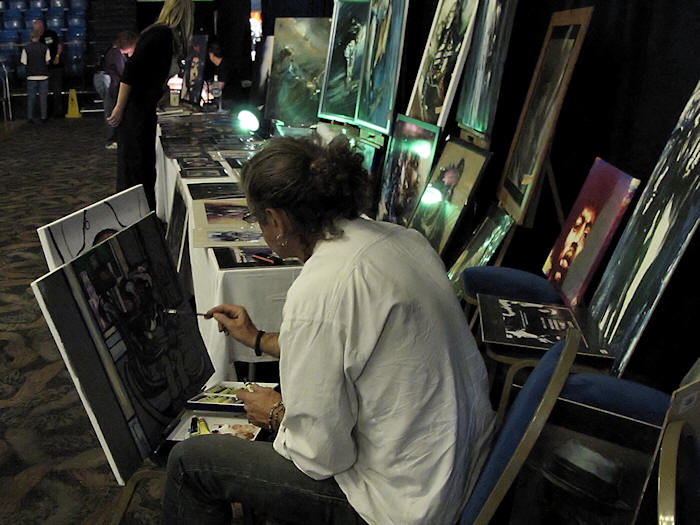
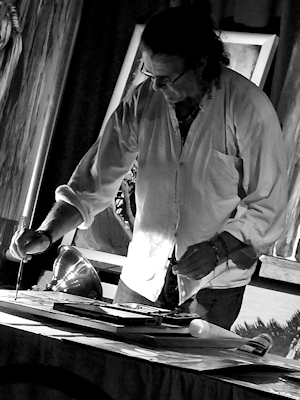 Christine: How has
your art developed over the years?
Christine: How has
your art developed over the years?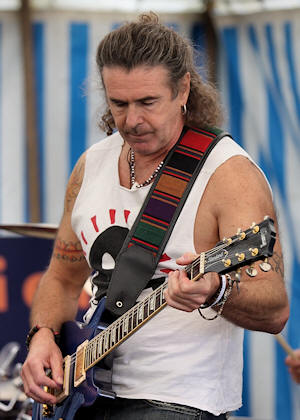 Alan: Turning to
music, what were your first musical memories?
Alan: Turning to
music, what were your first musical memories?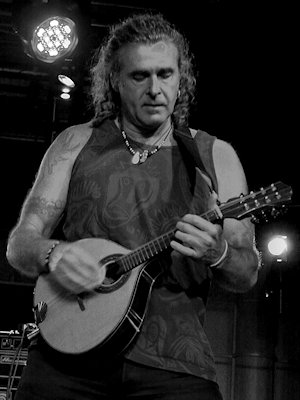 Alan: Whatís your
favourite instrument that you play?
Alan: Whatís your
favourite instrument that you play?